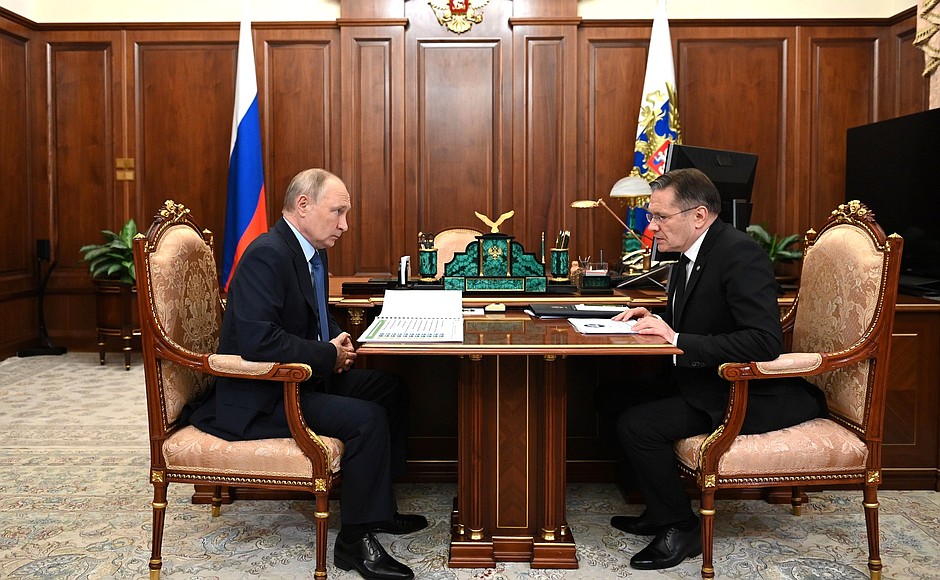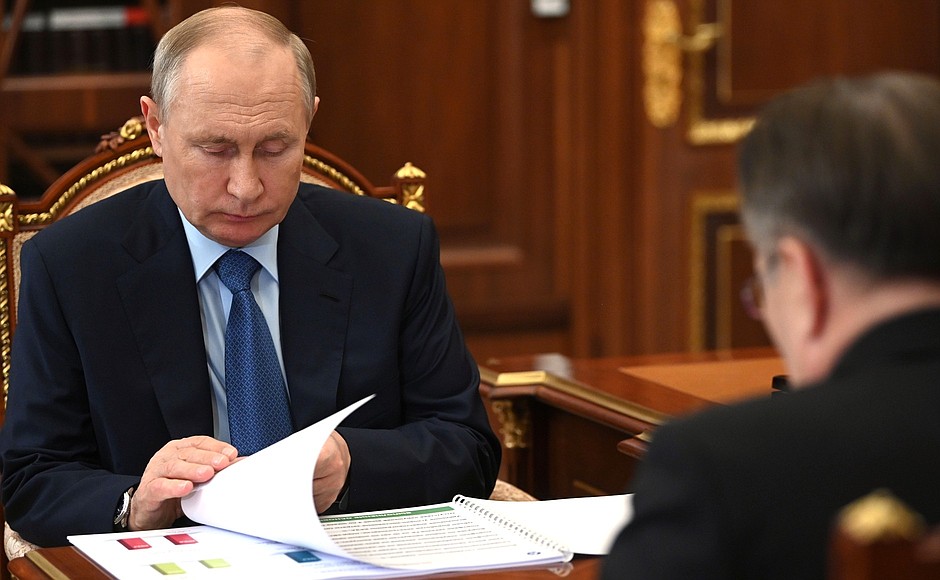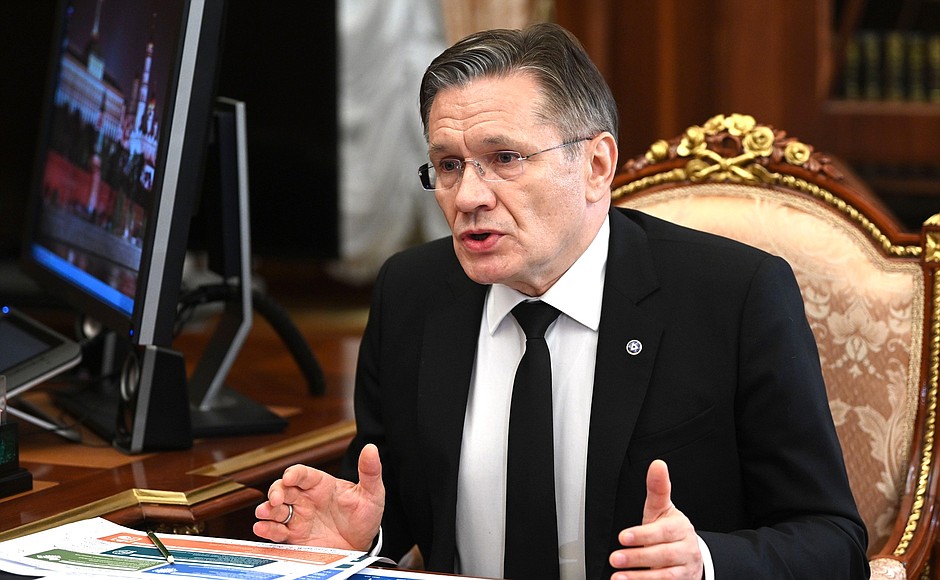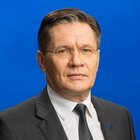President of Russia Vladimir Putin: Mr Likhachev, Rosatom ranks among the largest Russian companies. It is a multi-business company with 350 organisations and 300,000 employees. How do you view the situation at the company?
Director General of State Atomic Energy Corporation Rosatom Alexei Likhachev: Thank you very much for the opportunity to meet and report to you in person. We view the situation very positively despite the current external difficulties. Speaking about last year’s results and KPI maps, despite all difficulties, we fulfilled 105 percent, 100 percent of the state defence order.
I would like to point out a record in electricity production: 215.7 billion kilowatt-hours. This exceeds the Soviet maximum, when Armenia, Ukraine and Lithuania were part of the Soviet Union; we have exceeded this achievement. I have to say that at the same time the industry has a good level of safety. Sustainability indicators are improving every year, and there are positive trends in radiation safety, environmental safety, and industrial safety. Last year was the most successful in the history of the industry in terms of health and safety, which was especially important in this challenging year of the pandemic. All the results were reported to the Supervisory Board, and the Supervisory Board approved the results.
Positive trends persisted over the first six months of 2021 according to all indicators, and in terms of electricity production, we are seven percent higher than last year. So, I hope we will maintain the record level this year, too. It was 215 in 2020. I hope now it will reach 220; it is very likely.
And, if I may say a few words about the economic indicators. These are the results of six months: the first six months of 2021 against the first six months of 2020. We can see positive dynamics according to all the indicators.
Vladimir Putin: Has the number of foreign orders grown?
Alexei Likhachev: Yes, they continue to grow every year, and every six months. Both foreign orders and revenue from foreign orders, which is very important. Though, of course, the global economy has been under certain pressure during the pandemic.
Mr President, please see the top diagram: 1.5 trillion rubles is the income we will try to achieve this year. Let me stress that this is the open part of the income (regarding open products and open programmes), so in total it will be higher. The average growth is about 11.5 percent of income per year. At the same time, our own investment is growing at a greater rate. I hope that at the end of the year we will exceed 400 billion rubles in corporate investment.
As I have said, the annual growth of foreign revenue is almost eight percent. I would like to stress that over 18 percent is the growth of income from our new products: nuclear medicine, environmental projects, the Northern Sea Route, and wind power generation. This is quite a big addition to the company’s traditional nuclear technologies.
Vladimir Putin: What is the current state of our nuclear-powered icebreaker fleet?
Alexei Likhachev: It is perfect. If possible, I would just like to say a few words about this a bit later. But first of all, I would like to point out that not only our nuclear-powered icebreaker fleet but all our projects related to the Northern Sea Route are progressing, and possibly even faster than we planned. In this connection, we are conducting an additional analysis of icebreaker support requirements after 2024 or even 2030. We can see serious growth in all of the three areas: icebreaker escort services for our export projects (oil, gas, coal and metal); increased volume of coastal shipping, as per your instructions, namely, internal transportation in our huge country along the Northern Sea Route; and we also expect a major increase in transit volumes. The recent developments that took place in the Suez Canal and, in general, increasing global trade despite all the hurdles, call for creating alternative routes.
The international business community, the state and private businesses in various countries have indicated their interest in this. If you approve our idea, we would like to use our Northern Sea Route project as the basis for developing a major logistical container transport corridor. On the one hand, we will be able to use the available NSR infrastructure, in which we are investing both federal funds and the capital of the state corporation.
On the other hand, it will be a completely new level of business, an absolutely new level of the economic presentation of the State Atomic Energy Corporation and the country as a whole. And this will also bring objective advantages to the global economy. In this sense, we are aware of the possible shortage of icebreaker escorts, which is why we have formulated the relevant proposals and will present them to you today.
Vladimir Putin: Good.
Alexei Likhachev: We have been working under the conditions of the pandemic for the past year. In principle, I would like to use this occasion to say a few kind words about our personnel. As you may know, we managed to create a highly trust-based atmosphere over the past year. Since you issued an executive order on non-working days in March 2020, we have developed an extremely efficient interaction system with our people through weekly addresses and a hot line. Of course, we supported not only our personnel alone. We also helped protect people in the cities where our facilities are located, providing individual protection, PPE, separating flows and working on transport. We also took into account other requirements, such as hospital beds, the provision of necessary supplies required by enterprises and the medical facilities of the Federal Medical-Biological Agency. This produced an extremely positive result. People trust us, which greatly increased the level of their involvement.
Can I say a few more words about our production agenda?
Vladimir Putin: Tell me, please, about diversification in the defence industry.
Alexei Likhachev: Mr President, last year, we endorsed a ten-year diversification programme. The Rosatom Corporation plans to invest about 100 billion rubles into it. That said, by 2030 we expect a cumulative total of up to a trillion rubles in revenue from our defence industry enterprises and first of all, the nuclear weapons complex.
I hope that this year we will cross the barrier of 44 percent revenue from civilian and dual-purpose products. Our state corporation plans to increase this figure to the target you set of 50 percent, ahead of schedule, by 2024–2025. I do hope that we make it.
There are a number of new spheres. Our workers in the nuclear weapons industry are actively taking part in medical projects linked with nuclear medicine and also work on small energy units. In other words, the nuclear weapons complex has become an important part when it comes to the implementation of the national project on developing equipment, technology and research in atomic energy. This project has been going on since the start of this year primarily owing to your executive order. This is a very serious line of development; these are big nuclear cities. Of course, we will do all we can to improve the living standards of the people there.
If I may, I would like to show you one more project in this context. As it is coming up to the close of this presentation, I would like you to personally take a look at it. Please, open slide 22. When you visited Sarov last November, you supported the project on Greater Sarov. Then you issued a clear instruction to quickly organise the training of specialists there in cooperation with Moscow State University.
Vladimir Putin: Is it working out?
Alexei Likhachev: Mr President, we received a license for the operation of a Sarov affiliate. We will call it MSU Sarov. We signed a memorandum with 16 leading partner universities and institutes throughout the country and drafted five educational programmes for the first series, the first master’s degree students. The first 50 students will start on September 1 this year.
If you turn the page, you will see what campus awaits them, what student’s town they will live in. This is not just computer graphics, these are real buildings: townhouses for two people, academic premises, student educational zones and personal space. All of these features are also expressed in digits, so this is really a kind of a digital campus, so to speak. Naturally, we are very interested in this project.
Vladimir Putin: We will talk about the development of the nuclear weapons industry one-on-one. Thank you.
<…>



